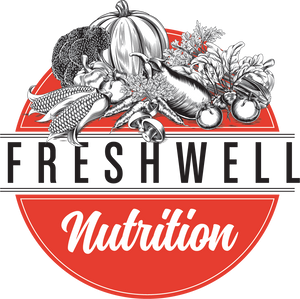What do people mean by "whole food" vitamins? Aren't all vitamins the same? The answer is no. For the better part of the last century, most vitamins were produced in laboratories using processes that were borrowed from the pharmaceutical industry. To this day, the majority of bulk vitamins are produced by "big pharma". These traditional synthetic vitamins haven't changed much in 100 years, and make up the majority of products on the shelves in pharmacy, grocery, and mass merchandise stores.
Over the last few decades, we've seen growing research indicating that these synthesized mass-produced vitamins may not be delivering the same benefit as natural vitamins in food. And so, a new class of vitamin supplement was born. These new "whole food" vitamins are typically either growin in food cultures (yeast) or actually extracted from plants before being concentrated into supplement form.
Difference Between Whole Food vs. Synthetic Vitamins
While big pharma is quick to argue that synthetic and whole food vitamins are chemically identical, their argument fails to take into account the growing body of research showing that there are thousands of phytochemicals in nature that have critical chemical relationships with these vitamins. We’re unclear about exactly what happens when we separate vitamins from these other natural chemicals. The general belief is that we’re losing something important.
Whole food vitamins are concentrated from actual plants. By harvesting the nutrition from the plant rather than synthesizing it in a lab, you’re getting a lot of the phytochemicals that surround the primary vitamins in nature. Therefore, is preserves those natural relationships, making these whole food vitamins much more similar to what you would find in food. This is very important.
Are Whole Food Vitamins Plant-based?
The technology to create whole food vitamins is moving very quickly. Currently all of the major vitamins are available in plant-based, vegan sources, however often manufacturers of the vitamins are not as transparent as they should be. If the manufacturer of the vitamin supplement doesn’t tell you exactly what plant the vitamin is sourced from, then you should ask. I’ve provided a clip from the label of a popular meal shake that claims to only contain 100% plant-based whole food vitamins. In this case, you can see the list of ingredients that are used to source the vitamins. This is a good indicator that the vitamins are in-fact real.

Whole Food Sources of Vitamin D and B12
Vitamin D and B12 are both common in many of the foods we eat such as meat, dairy, and fish. But finding natural plant-based sources of vitamin D and vitamin B12 in supplemental form can be challenging. As described above, this is typically when you have to ask a manufacturer specifically about the source. The most common source of plant-based vitamin D is from a plant organism called lichen. Lichen is a very complex symbiotic organism – part mushroom and part algae. Lichen is very nutrient-dense. One of those nutrients is natural vitamin D. When looking at vitamin labels, you’ll want to look for the term “lichen” or the tradename which is Vitashine™ vitamin D3 .
Plant-based vitamin B12 is also very difficult to find. As of the publication date of this article, the only reliable source of supplemental vitamin B12 is from bacteria (yeast). The vitamin is cultured in the yeast and then isolated. So, while it’s plant-based, it’s still technically not “whole food” source vitamin B12 because it’s not extracted from a whole plant. Still it’s not a bad option for people on a vegan or vegetarian diet who may struggle to get this nutrient in their diet.
How Do I Make Sure I’m Getting the Best Whole Food Vitamins?
Do your homework - make sure that you’re eating nutrient-dense foods that are chock full of these critical vitamins. OK, I know what you’re thinking: who wants to do all of that homework to carefully identify all of these nutrient-dense foods? Don’t worry, we’re going to do the homework for you! Later this year, we’ll be publishing a free guide and offering it to our subscribers. Be sure to sign up below.
Qualify your supplements – if you’re looking for quality whole food supplements, the key word is transparency. Stick with companies who openly disclose all of their ingredients and who are very specific about what food source the vitamins come from. Also, look for trademarked ingredients. One example is the Vitashine™ D3 ingredient referenced above. If you follow the link to the website, you’ll see that the company that makes VitaShine™ D3 has special processes for sourcing and manufacturing their D3. That’s why it is trademarked. Generally, trademarked ingredients have more stringent quality control and more research to support them.
Subscribe Here For More Helpful Info
If you found this article helpful, please let us know in the comments and signup for our newsletter where we will share other tips and information from vitamin industry insiders.
Sign up here:

